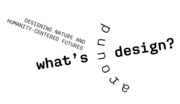 | WAD?2024: What's Around Design? 2024 Museu de Portimão Portimão, Portugal, October 8-11, 2024 |
| Conference website | https://www.whatsarounddesign.ismat.pt/ |
| Submission link | https://easychair.org/conferences/?conf=wad2024 |
What's Around Design? 2024
"What's Around Design?" is a pivotal gathering of minds in the Algarve dedicated to exploring Design's profound impact and potential in addressing today's multifaceted challenges.
Extreme climate changes, mass migrations, housing shortages, waste, pollution, deforestation – there is a pressing need to promote a rethinking of traditional design paradigms, aiming for strategies to mitigate these problems and promote a more sustainable and equitable future.
Approaches like nature-based solutions, circular economy, nature-inspired design, speculative design, and green transition allow designers to anticipate and prepare for various scenarios, creating proactive, adaptable solutions that harmonize with the environment.
"What's Around Design?" is about the expanded fields of Design around critical issues that will be explored along five tracks:
Track 1 - Nature-based Solutions
Track 2 - Circular-based Territories
Track 3 - Biodesign
Track 4 - Speculative Biofutures
Track 5 - Strategic Design for Green Transition
Experts and thought leaders will share insights and inspire discussions, workshops, and exhibitions, all highlighting the pivotal role of Design in addressing global challenges and shaping a better world.
Join us as we embark on this journey to harness the power of Design to create a sustainable, resilient, and equitable future. Together, we can transform today's challenges into tomorrow's opportunities.
Welcome to "What's Around Design?" 2024 — where the future is designed.
TRACK 1 - NATURE-BASED SOLUTIONS
The "Nature-Based Solutions" track will delve into the synergy of community-driven innovation through Co-Creation and Participatory Design and Co-Design Processes to enhance health and well-being. We emphasize the importance of involving local communities in developing nature-based solutions that address environmental challenges while fostering social equity. We welcome researchers to explore case studies showcasing successful collaborations between designers, residents, and stakeholders, highlighting methods for co-creation and participatory design. By focusing on inclusive and holistic approaches, this track aims to demonstrate how community engagement can lead to sustainable, health-promoting environments that reflect the needs and aspirations of those who inhabit them.
TRACK 2 - CIRCULAR-BASED TERRITORIES
Circular-based territories integrate circular economy principles to create sustainable, self-sufficient communities, emphasizing minimizing waste, maximizing resource efficiency, and promoting local production and reuse. That can be achieved through innovative urban planning incorporating renewable energy sources, green infrastructure, and closed-loop systems for water and waste management, as well as by fostering local economies prioritizing recycling, upcycling, and using biodegradable materials. Design is paramount in this process, from strategizing to developing services and products supporting the territory's circularity. Through mindful planning, cities can reduce their environmental footprint, enhance resilience, and improve the quality of life for residents, ensuring a sustainable future for generations to come.
TRACK 3 - BIODESIGN
Biodesign is a practice that cultivates interspecies empathy while building knowledge from biological systems. It is an innovative design area fueled by cross-disciplinary cooperation that harnesses the capabilities of living organisms to create sustainable and efficient solutions. Therefore, Biodesign promotes the development of materials and systems that are not only functional but also environmentally friendly. This track offers a unique opportunity to delve into its transformative potential, showcasing pioneering research and practical applications. Key topics include bio-inspired products and materials, engineered living systems, and biomanufacturing techniques that address pressing global challenges and enhance life quality through biologically integrated technologies.
TRACK 4 - SPECULATIVE BIOFUTURES
Speculative Biofutures invites you to envision and project future scenarios shaped by the design and application of biological sciences and technologies. This track explores the transformative potential of advancements in biotechnology, encouraging speculative thinking to imagine how these innovations might revolutionize various aspects of life, society, and the environment. Exploring speculative futures and considering how cultural and philosophical perspectives on life, identity, and humanity might evolve in response to biotechnological advancements must be addressed, mainly through the ethical, legal, and social lenses. Opening for an interdisciplinary approach, speculative futures draw on insights from various disciplines, including biology, ethics, sociology, and science fiction, to create comprehensive and imaginative visions of the future. Speculative Biofutures challenge researchers' communities to think beyond current limitations and envision a future where technology harmonizes with nature to create a safer and more sustainable world for all species.
TRACK 5 - STRATEGIC DESIGN FOR GREEN TRANSITION
The "Strategic Design for Green Transition" track will explore innovative approaches for fostering a nature-positive economy. It envisions exploring models integrating ecological sustainability with economic growth, emphasizing regenerative practices that restore natural systems. We aim to co-create with the research community insights into strategic framework formulation and design methodologies development that prioritize biodiversity, resource efficiency, and environmental resilience. This track aims to empower participants with the tools and knowledge to lead the transformation toward a sustainable and prosperous future by highlighting successful case studies and emerging trends.
Type of submissions
Submitted papers must meet the following rules:
Full papers
Between 8 to 12 pages, including title, abstract, keywords, main paper body and images (bibliographical references are included in the limit of pages);
Short papers
Between 4 to 6 pages, including title, abstract, keywords, main paper body and images (bibliographical references are included in the limit of pages).
Extended Abstracts
Up to 600 words, including keywords.
Key dates
Deadline for Extended Abstracts, Short and Full papers - 31 July 2024
Notification of acceptance - 01 September 2024
Deadline for registration for presenters and contributors - 15 September 2024
Camera ready paper - 30 September 2024
Conference days - 8/9/10/11 October 2024
